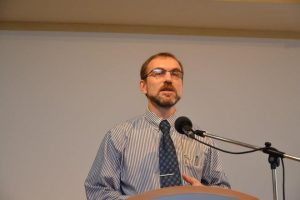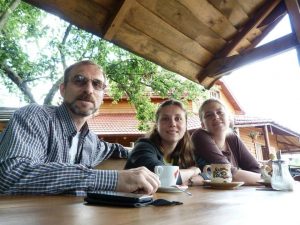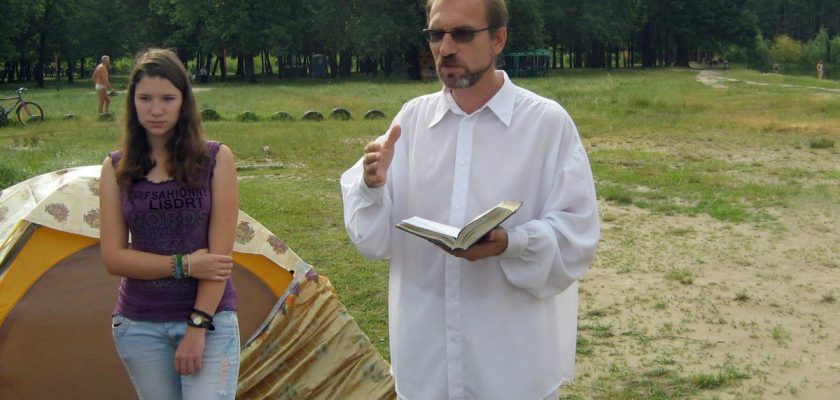Pastor and missionary Igor Plyva about himself, his life, ministry, and the “new-old” calling…
How would you introduce yourself to the reader?
My name is Igor Plyva. I’m from Kiev. I was never going to be a believer, as I was an atheist. Came to church to argue with their leadership, because they started to “confuse” my wife with “their networks,” as I thought. Gradually, I was interested in what was happening there. Started to ask questions. I drew attention to what God’s Word says about me. I didn’t imagine that it is so deep. Scripture not only diagnoses ˗ the sinner, but explains how to solve the problem of personal sin.
Then has come a moment when the atheistic arguments have been defeated. I have rejected their incompetent evidence. I had to make a choice: to get up and leave, or to understand what is the truth and to be on its side.
I liked to read. But when I took over the Bible, I realized that you need to think and to will not manage to “swoop” it. I had a lot of counterarguments concerning Scripture, and therefore the process of conversion was prolonged.
When exactly did you come to the question of salvation?
If you understand your sinfulness, then the personality of Christ clearly appears, as it is written, that He is Redeemer. For example, one of the places of Scripture: “Behold the Lamb of God who takes away the sin of the world.” (John 1:29).

Please, tell us chronologically about the development of your Christian life, ministry?
Repented in 1993. In 1994 was baptized. In 1995 joined a group from church “Transformation” in Kiev, which, with the blessing of Pastor Peter Vasilyevich, together with “Hope to people”, began service in my microdistrict – Darnitsa. For me, it was obvious that there is necessary to help. Since that time I have helped there.
In church “Transformation” I’ve gradually entered the Brotherly council. Then I was given the task of organizing the choir. For this I was sent to study. At school, in addition to music, I studied dogmatics and understood that it attracts me more than a choir. However, returned to church, I prepared the choir and conducted it until realized it’s not mine. Then was found a professional choir director, American. He took over the choir. And at this time in “my microdistrict” where was started a home group, was a question of creating a new local church and its status. The majority voted for an independent church.
And how have you been called to pastoral ministry?
There was a time when Alexander Kuchkovsky (leader of the group, and then the church) for health reasons had to leave. With the consent of the church and the IPO “Hope to people” I was left in charge. So it took a little over a month, as I was acting pastor. Before this case there was similar experience in church “Transfiguration”. When most of the members of the church went to camp, I stayed to hold services.
In 2000 was still needed a new pastor. Michael Dubovik, Taras Nikolaevich and the other brothers came to talk about the continuation of service. And I was put on the position of pastor. I came home and told my wife. Nina started crying. She knew my weaknesses and was worried.
The case proceeded. First I had quarreled with many people, because I thought that everything must be “this way.” Therefore, I faced with disagreement. Then I understood I was wrong. It took five years to make up with everyone. In the process of reconciliation, in 2003 I was ordained.
As far as it’s known, in your terms of service, in particular missionary, have appeared some changes? Tell us about them. How are they done?
I visited Rivne and was called a missionary. “Am I a missionary?», – I thought. I live on Darnitsa and serve in the Church. Then, talking to the missionaries and getting acquainted with the literature on this subject, I began to understand.
In 2010, Michael Dubovik invited me to go to Tuva. That was the first so far away trip in my life. We were there six weeks. I saw a different of culture, saw problems: ethnic, spiritual. As for me, it was as if the whole new world had opened. I realized that missionary work is not a matter of loners. It is a great responsibility of a very large group of people.
Lord has worked through us. But, more importantly, that He was working in me. After all, you can be God’s instrument, but does not have any benefit for your heart. Returned to church, I was telling brothers about the mission in terms of personal experience.
Then one brother, Eric Oldenburg, offered to undergo “Kairos”. I decided to pass it to know what to do with it in regard to my church. Then about 20 people have taken this course too. For the Church of 70 members it’s a lot. Then the understanding of mission truly became clear. I used to read books, but their academicism didn’t “suit”. You had to practice and but there was no experience. After taking the course, I understood how the mechanism for the mission should work. I realized that missionary work is the main theme of Scripture. I told about my experiences the council of Association of Bible Missionary Churches in Ukraine…

We know that you travel regularly to the South of the country. How did you make such decision? What are you doing there and what you have learned during this time?
In summer we went there in the usual tours. At one point I thought about what we were doing there: walking, swimming, having rest, etc. But what we were doing for people? Did we paid attention to them? Then I got acquainted with Zakiem. He talked about his ministry and its complexity. Then I met former Muslims who became believers. It became clear that the cross-cultural barriers will always be, especially, taking into consideration the historical context.
After some time, Scat Carter (minister-missionary), I and “my team” went to the South and were there three days. From morning to night, we had meetings with different people: missionaries, Muslims, Russians, translators of the Bible. And, indeed, we have seen that there is no success. There was a problem. Everyone complained that nothing happens. In my opinion, if something does not work the methods are wrong, not the people. There are objective reasons. You can be on the right side and there will be output (response).
Two years ago we started to go there ourselves. One more sister has added. The first time we were helped by Yura S. For a week we had five serious meetings. Every evening, returned “to the base” and talked till late night. Every day, we overcame about 200-250 km.
On that trip I even more understood the problem of creating a national church. But we were not left unanswered. At one meeting, I met a brother-missionary named Vakiri* and I got for myself at least a partial answer to the question “why so?”. He has enough resources to build a normal house. But not to confuse and not to tempt the neighbors, they and his wife agreed not to build the house very quickly. By selecting this tactic, for two years they gathered around a small group of people and then even added people from related cultures: Uzbeks, Tajiks, etc.
There I realized that this is the context on which we should work, to study their native language, to say Isa Masih instead of Jesus. Use the Bible of green color, not black, because the last is the color of Shaytaan. Many of them are very superstitious. Stand before God on their feet is a challenge. You have to sit. Thus, you show that you are earthy, earthly, created from the dust. So you express your insignificance. If you stand, then you are a mula, i.e. you have the right or think too much about yourself. Scripture can not be put on the floor or to underlined. It seems a lot of unnecessary conventions, but for all of them they are significant. Decades are needed, until something happens. This was the second trip. In April, there was no longer Jura nor Zakia. But the last recommended to get acquainted with the Big Kay. He was “a child of the world”, he is from local people. He has many relationships with locals. He is open, specific and purposeful in reaching “his people.”
Big Kay said that God’s action is important, not a transfer of tradition and experience. On that trip, we met with his brother Igor, his heart is devoted to serve the Muslim people. They have a room in a convenient place to do it, and most importantly ˗ big heart.
What is your vision for the future to develop the mission and kindle the missionary spirit in others?
It is necessary to bring churches even at the zero level. “Kairos” in this sense is not a panacea, but it helps to understand well your own place in the mission. Therefore, I would like to get a certificate in next six months that will give me the opportunity to teach “freely” this course in churches. It will help church members identify “base line” of missionary service. Year will be spent on teaching within the Association. Then another year to familiarize those interested in serving the Muslim culture in the south. Although, there are thoughts to prepare people to serve the Buddhist cultures as well.
And what are your expectations? How can it help the ministry in the South?
You must have at least two teams of 4-5 people. There are groups. We need to preach, to lead them and to bring into the church context. Scripture, prayer, communication … We need to make it a regular practice of their lives. Because, for example, communication is perceived normally, and reading is not!
Quarterly these teams will go to form local congregations at the residences of the people. This will be the matter of prepared ministers. Someone can be trained in less than two years. But in the very beginning and preparing of the case is a big plus. Where this process begins, God draws His will and uses people to do His work.
Incidentally, in the South there are other nationalities, indigenous inhabitants. Over 20 nations! For example, the Karaites. When this process starts, it will capture more local churches. This reorients church thinking. There always is a problem in the church to be solved. But if you puzzle only internal problems, they will never dare. But, as it turns out, when the body of Christ is engaged in the mission some internal difficulties somehow disappear…
Interviewed Artem Pristupa


